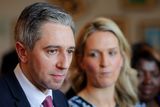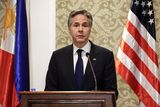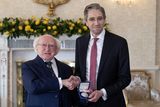Fixing health service a good way to honour sacrifices
A health worker administers a Covid-19 vaccine in the Aviva Stadium earlier this year. Photo: Arthur Carron
Hard lessons are supposed to pay dividends if they are to have any benefit.
Speaking to employers group Ibec this week, Tánaiste Leo Varadkar said he wanted to build “a new economy that is more inclusive, more secure” and a “just society”. Sounds suitably soothing, given the bruising so many have taken.
He then read out a list that may have had some in his audience squirming in their seats. Among other things, it included “a living wage, statutory sick pay, occupational pensions for all workers, flexibility in the workplace, remote working and more opportunities for promotion, training, education, research and gender equality”.
All worthy and noble in aspiration, but missing were the details of how it might be done.
The pandemic was a test that brought out the best in our society. Frontline workers distinguished themselves, but at every level, whether working from home or out there in the thick of it, people gave their all, putting their lives at risk every day. You cannot put a value on such sacrifice. It is the very essence of humanity.
It has been argued that to give real service you must add something that cannot be bought or measured with money, and that is precisely what so many did. So, whether it is 10 days’ holidays for HSE workers or bonuses all around, whatever is put on the table would never be sufficient recompense.
What thousands of people in this country were prepared to do so others could be safe was not of a transactional nature. It went deeper than that. If their selflessness is to be marked in a meaningful or significant way, a marker must be set down to guarantee they should never be put in such impossible positions again.
There is unease already that with one eye – or perhaps both – on an election, political wishes-to-reality ratios are becoming ludicrously unbalanced.
Good intentions must not get confused with good practice. In the Dáil, Public Expenditure Minister Michael McGrath warned that the cost of extra pay or leave for all in the public sector as a reward could top €1bn. This at a time when the State will soon owe €250bn. No one feels these workers do not deserve it: the question is, do we have it to give?
On World Health Day, WHO director-general Dr Tedros Ghebreyesus said a unique opportunity has emerged to build a better world. The pandemic thrived amid inequalities in society and the gaps in health systems. He said: “It is vital for all governments to invest in strengthening their health services and to remove the barriers that prevent so many people from using them.”
To fix our health services would be a fitting way to honour the sacrifices of so many.
The temptation is to merely trifle with expectations rather than improve realities, but we have to be better than that.
Join the Irish Independent WhatsApp channel
Stay up to date with all the latest news














